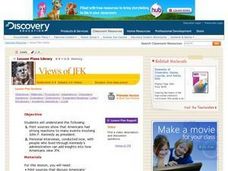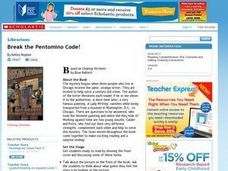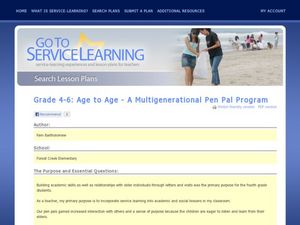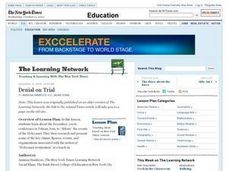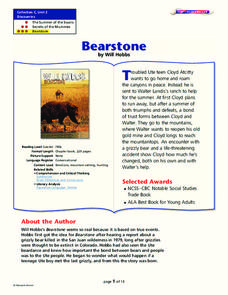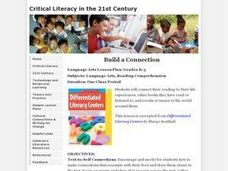Curated OER
Views of JFK
Learners review the highlights of Kennedy's campaign and presidency. They least three of the issues related to JFK to research through both print resources and interviews. In addition, they create written summaries from collected...
Curated OER
Human Prehistory
Students discuss the history of humans. In this human history lesson, students describe how the placement of the continents changed and where the humans began and traveled to. They discuss interaction with Neanderthals and dogs.
Curated OER
Break the Pentomino Code!
Students read and analyze the book, Chasing Vermeer. They discuss the main story elements, analyze how pentominoes are important to the story, use a pentomino code to decipher a message, and create a secret code of their own.
Curated OER
Museum of Computer Technology
Students research the five generations of computing devices and computer inventors, and create a virtual museums.
Curated OER
Harriet Tubman: Recognizing the Human Agency
Tenth graders examine the contributions of Harriet Tubman to the history of Canada. They read a handout, complete a handout in small groups, and write a speech evaluating how Harriet Tubman changed history.
Curated OER
True Champions Practice Points-Responsibility
Learners explore personal responsibility. In this character development lesson, students discuss and analyze a quote from Mia Hamm, a U.S. soccer player. Learners brainstorm short and long term personal and team member responsibilities...
Curated OER
Poetry Describing Ordinary Life
Students examine the cultural and historical context which a poem is written in or describes. In this poetry lesson, students listen to an online recording of Philip Larkin reading "The Whitsun Wedding." Students explore how the poem...
Curated OER
A Multigenerational Pen Pal Program
Learners discover the benefits of writing letters to multigenerational pen pals. In this pen pal lesson, students identify a need for communication among the generations. Learners begin a pen pal program with the elders in the community.
Curated OER
Then What Happened?
Students read the book, Diary of a Worm, by Doreen Cronin. After answering questions, the do a variety of activities such as a "Dear Diary," "Book Report Card," and/or "Animal Mural."
Curated OER
First Nations: Analysing Sources
Ninth graders examine the lifestyle and culture of First Nations people. They investigate and analyze primary and secondary source documents.
Curated OER
HI-02-01 Somalia: A Failed Intervention?
Students study ethics and the importance on humanitarian interventions. In this lecture activity students read case studies and answer questions regarding the importance of government and humanitarian interventions then watch a film...
Curated OER
Analyzing Poetry and Characters
Students investigate historical context by reading poetry. In this language arts lesson, students discover the work of Michael Longley and examine his poem "Ceasefire." Students identify the sonnets used in the piece and discuss the...
Curated OER
Native Americans in Arkansas: The Quapaw
The Quapaw Indians of Arkansas are the focus of this American history lesson. Learners discover many aspects of the Quapaw culture, such as their dwellings, social organization, food, and how the tribe was eventually driven out of...
Curated OER
Marriage and Financial Goals, Budgeting Strategies
There is no more useful life skill to learn than budgeting and setting financial goals. It's math that is used by every person, everyday. Learners examine the responsibilities and costs involved in family economics. Through a series of...
Curated OER
Denial on Trial
What is the "Faurisson Affair”? What is “Holocaust Revisionism”? What does freedom of speech entail? Do revisionists have a right to voice their ideas? Such questions are at the heart of a richly detailed, thought provoking lesson...
Curated OER
Heroes in Art
Students examine the life, portraits and speeches of Frederick Douglass. They consider what made his speeches effective and why he is regarded as a national hero. They write an original speech.
Smithsonian Institution
A Ticket to Philly—In 1769: Thinking about Cities, Then and Now
While cities had only a small fraction of the population in colonial America, they played a significant role in pre-revolutionary years, and this was certainly true for the largest city in the North American colonies: Philadelphia. Your...
Library of Congress
To Kill A Mockingbird: A Historical Perspective
Students study the novel, To Kill a Mockingbird. Through studying primary source materials from American Memory and other online resources, students of all backgrounds study the relationships between blacks and whites.
Curated OER
Development of Federal Civil Rights Acts : 1950's - Present
Students use the Internet to research one of five cases associated with Brown v. Board of Education and then join a group with people who researched the other four.
Curated OER
Bearstone
Use the story "Bearstone" by Will Hobbs to explore issues related to growing up. In this work, a troubled teen finds himself through an adventure in the wilderness. Learners practice summarizing, drawing inferences and conclusions, and...
Curated OER
The Ethics of Outsourcing to China
After viewing clips from a documentary on factory work in China and US outsourcing, learners have a fishbowl discussion. They work in groups to build both personal points of view and strong arguments on the effects of outsourcing in...
Curated OER
Insects A-Z!
Alphabet insects! Who has ever heard of such a thing? Get ready because your class is going to research insects that start with a specific letter of the alphabet. In small groups, they'll use the Internet and reference texts to locate...
Curated OER
An Introduction to Microbes - Biology Teaching Thesis
Students are able to define microbes and identify the five main groups of microbes. They are able to give examples of ways in which microbes have impacted or currently impact human life. Students are able to explain that not all microbes...
Curated OER
Build a Connection
Learners discuss their personal connections with stories they've read in the past and identify techniques to connect with more stories. They create illustrations, construct task cards, and complete sentence stems based on books they read...


